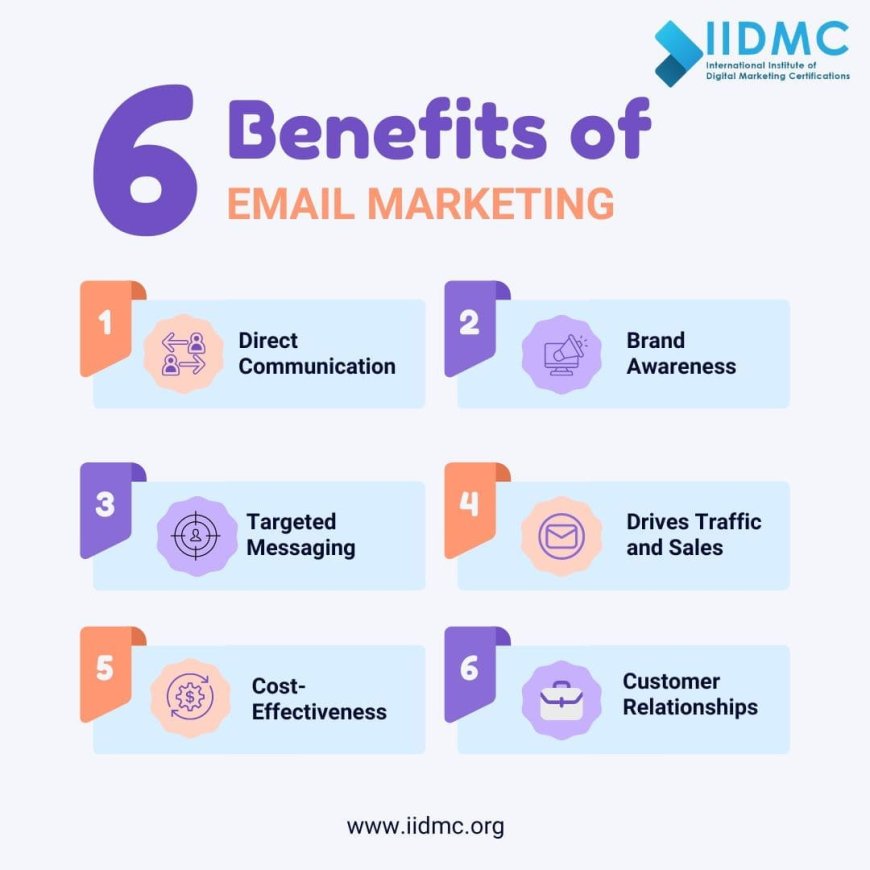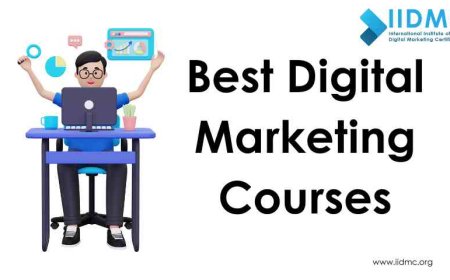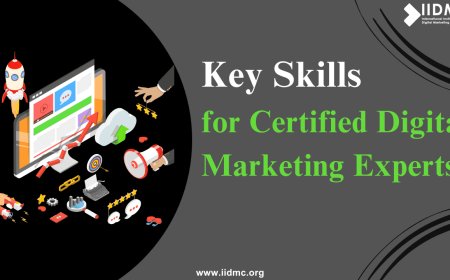Key Benefits of Enrolling in an Email Marketing Course
Discover the advantages of an email marketing course. Improve skills, gain valuable training, and boost your digital marketing efforts.

Email marketing is a powerful tool that enables businesses to directly engage with their audience through personalized messages delivered to their inbox. By segmenting email lists and tailoring content to specific demographics and behaviours, marketers can drive engagement and conversions. With its high ROI and cost-effectiveness, email marketing remains a cornerstone of digital marketing strategies. However, success requires careful planning, adherence to best practices, and compliance with regulations to maintain brand reputation and legal integrity. Overall, email marketing offers businesses a direct and effective means of building relationships, driving sales, and achieving marketing objectives.
Email marketing holds significant importance in digital marketing due to its ability to establish direct, personalized communication with target audiences, driving engagement and fostering relationships at a low cost. Its measurable results, scalability through automation, and effectiveness in delivering timely and relevant content make it a cornerstone strategy for businesses seeking to maximize ROI and build brand loyalty in current digital marketing.
Demand for email marketing skills among businesses and professionals
Email marketing remains a cornerstone of digital marketing strategies for businesses across various industries. While social media platforms and other digital channels have gained prominence, email marketing continues to hold its ground due to its effectiveness and direct reach to the audience.
Businesses value email marketing skills for several reasons
-
Cost-Effectiveness: Compared to other forms of digital marketing, email marketing is relatively inexpensive. It offers an impressive return on investment (ROI) when executed well.
-
Direct Communication: Emails allow businesses to communicate directly with their audience. Unlike social media platforms, where algorithms can limit reach, emails land directly in subscribers' inboxes.
-
Targeted Marketing: Email marketing enables businesses to segment their audience based on demographics, behaviour, or past purchases. This targeted approach increases the relevance of the content, leading to higher engagement rates.
-
Automation Capabilities: Automation tools simplify email marketing campaigns by allowing businesses to schedule emails, trigger responses based on user actions, and personalize content at scale.
-
Measurable Results: Email marketing platforms provide detailed analytics, allowing businesses to track open rates, click-through rates, conversions, and other key performance indicators (KPIs). This data helps in refining strategies for better results.
-
Retention and Loyalty Building: Emails are effective in nurturing leads and maintaining relationships with existing customers. Businesses use email marketing to provide valuable content, exclusive offers, and personalized recommendations, fostering customer loyalty over time.
Difficulties of choosing the right Email marketing course
Overwhelm with Choices: The sheer number of email marketing courses available online can be overwhelming. Sorting through various platforms, instructors, and course formats can make it difficult to decide which one is the best fit.
Quality Variability: Not all email marketing courses are created equal. Some may offer comprehensive, up-to-date content with expert instructors, while others may provide outdated or superficial information. Distinguishing between high-quality courses and those of lesser quality can be challenging.
Lack of Accreditation: Unlike traditional educational programs offered by universities or colleges, many online courses lack accreditation or formal recognition. This can make it challenging to assess the credibility and reliability of the course content and instructor.
Cost Considerations: Cost is often a factor when choosing an email marketing course. While some courses may be free or low-cost, others may come with a significant price tag. Balancing the cost with the perceived value and quality of the course can be a challenge.
Course Format and Learning Style: Email marketing courses come in various formats, including video lectures, written materials, interactive exercises, and live sessions. Choosing a course format that aligns with your preferred learning style and schedule can be difficult.
Relevance and Currency of Content: The field of digital marketing, including email marketing, is constantly evolving. Courses that offer outdated or irrelevant content may not provide the skills and knowledge needed to succeed in today's competition.
Lack of Reviews and Recommendations: Without firsthand experience or recommendations from trusted sources, it can be challenging to assess the quality and effectiveness of an email marketing course. Limited reviews or testimonials may leave you uncertain about whether the course will meet your needs and expectations.
What are the potential benefits of investing time and resources in learning email marketing?

-
Direct Communication: Email marketing allows you to directly communicate with your audience, bypassing algorithms and potential social media noise. This direct line of communication can lead to higher engagement and conversion rates.
-
Targeted Messaging: With email marketing, you can segment your audience based on various criteria such as demographics, purchase history, or interests. This allows you to tailor your messages to specific groups, increasing relevance and effectiveness.
-
Cost-Effectiveness: Compared to traditional marketing channels like print or TV advertising, email marketing is relatively inexpensive. It doesn't require a large budget to get started, making it accessible for businesses of all sizes.
-
Measurable Results: Email marketing platforms offer robust analytics tools that allow you to track metrics such as open rates, click-through rates, and conversion rates. This data provides valuable insights into the effectiveness of your campaigns, enabling you to make data-driven decisions and optimize your strategies.
-
Automation: Email marketing automation allows you to set up predefined workflows and triggers, such as welcome emails, abandoned cart reminders, or follow-up sequences. Automation saves time and ensures that your subscribers receive timely and relevant messages.
-
Builds Customer Relationships: Consistent and valuable communication through email can help build stronger relationships with your audience. By providing useful content, exclusive offers, and personalized recommendations, you can foster trust and loyalty among your subscribers.
-
Increases Brand Awareness: Regularly appearing in your subscribers' inboxes keeps your brand top-of-mind. Over time, this can contribute to increased brand awareness and recognition, which is essential for attracting and retaining customers.
-
Drives Traffic and Sales: Well-crafted email campaigns can drive traffic to your website or physical store and ultimately lead to sales. Whether you're promoting new products, announcing special promotions, or sharing valuable content, email marketing can be an effective driver of both online and offline revenue.
Enrolling in an email marketing course presents a multitude of benefits for businesses and professionals alike. From its unparalleled ability to establish direct and personalized communication with audiences to its cost-effectiveness, measurability, and automation capabilities, email marketing remains an indispensable tool in the digital marketer's arsenal. Despite the challenges of choosing the right course, investing time and resources in learning email marketing can lead to enhanced customer relationships, increased brand awareness, and ultimately, driving significant growth in both online and offline sales. As businesses strive to stay ahead in the competitive digital landscape, mastering the art and science of email marketing is essential for achieving sustained success and maximizing marketing objectives.





























